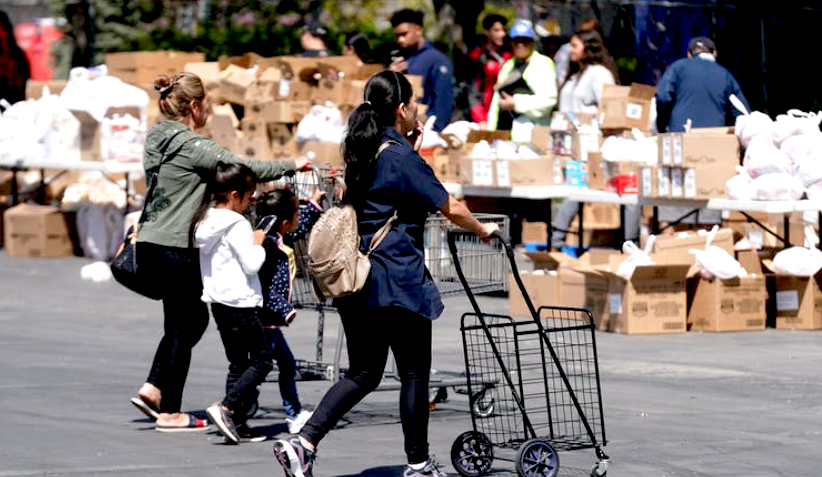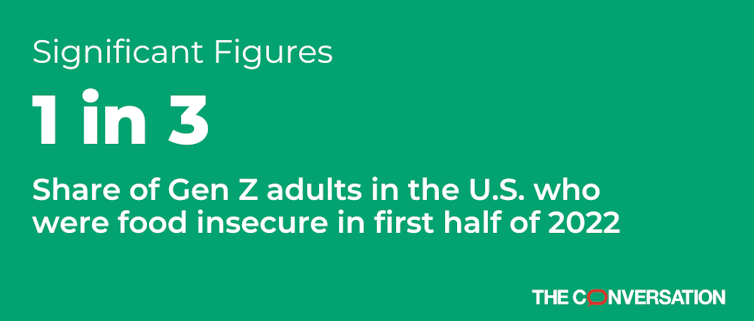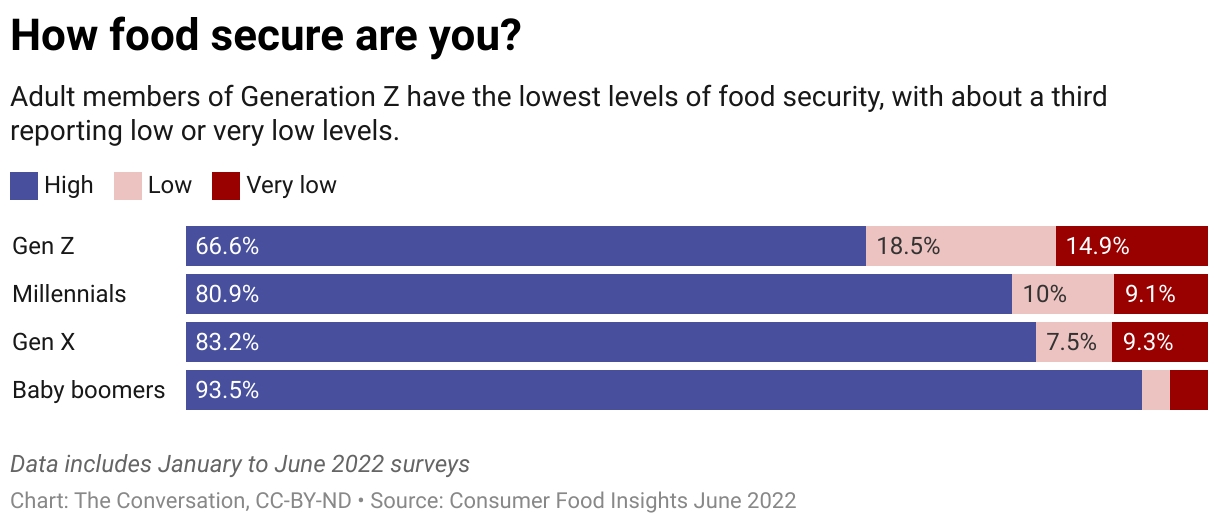The authors’ survey shows a significant portion of Gen Z – 30 percent – has relied on free groceries from a pantry, church or other charity.

About 30 percent of Gen Z adults needed help from a food bank or other charity to get enough food in 2022. (AP Photo/Rick Bowmer)
By Sam Polzin, Ahmad Zia Wahdat and Jayson Lusk
The Conversation

(CC BY-ND)


 Adult members of Generation Z are experiencing food insecurity at over twice the rate of the average American, according to our latest consumer food survey. In fact, about 1-in-3 Americans born from 1996-2004 have had trouble affording enough food in 2022.
Adult members of Generation Z are experiencing food insecurity at over twice the rate of the average American, according to our latest consumer food survey. In fact, about 1-in-3 Americans born from 1996-2004 have had trouble affording enough food in 2022.That compares with fewer than 1-in-5 millennials and members of Generation X, and fewer than 1-in-10 baby boomers.
We run the Center for Food Demand Analysis and Sustainability at Purdue University, and every month, through our Consumer Food Insights survey, we query over 1,200 Americans with the goal of tracking national food security as well as many other behaviors, attitudes and preferences related to food.
Food insecurity means having a lack of money or other resources for food. And when food insecurity surges, it can take a long time for affected populations to recover. After the Great Recession that ran from 2007 to 2009, food insecurity increased by 34 percent. It took a decade for food insecurity to drop to its pre-recession levels.
 With Covid-19, food insecurity increased again, particularly among the most vulnerable groups in society, such as seniors and households with children.
With Covid-19, food insecurity increased again, particularly among the most vulnerable groups in society, such as seniors and households with children.
But it also increased for members of Gen Z, who were the most likely to face unemployment due to the pandemic. And for those attending college, the pandemic reduced essential food services on campus and increased the number of students dropping out of school.
Now, with inflation soaring at the fastest pace in 40 years, those who lost jobs during the pandemic and college students with fixed incomes must stretch their limited resources even further at the grocery store.
We have found that education, income and race are three of the biggest factors driving food insecurity among America’s youngest generation. Members of Gen Z without a college degree or who make less than the federal poverty line have a much higher risk of being food insecure – over three times the risk of other Gen Z households. The rate of food insecurity among Gen Z Black and Hispanic households is almost double that of white and Asian households.
Other research shows that factors like marriage and owning your own home typically improve food security. Since young people typically aren’t married or own a home, Gen Z by and large isn’t benefiting from these factors.
Additionally, full-time college students are generally not eligible for the Supplemental Nutrition Assistance Program, formerly known as food stamps. Although student eligibility has been expanded during the ongoing Covid-19 public health emergency, the paperwork required to apply can potentially discourage young people who have much less experience navigating the government bureaucracy.
Our survey also shows a significant portion of Gen Z – 30 percent – has relied on free groceries from a pantry, church or other charity.
Prices for food consumed at home are currently jumping at over 12 perecent a year. That’s the fastest pace since 1979. Our survey data only reflects some of these recent price gains, so it’s unclear yet how much this will affect food insecurity. But what is clear is that Gen Z Americans, like other vulnerable groups, need more support to ensure they can access an affordable diet.![]()
Sam Polzin is a food and agriculture survey scientist at Purdue University.
Ahmad Zia Wahdat is a postdoctoral research associate in agricultural economics at Purdue University.
Jayson Lusk is a professor of agricultural economics at Purdue University.
This article is republished from The Conversation under a Creative Commons license. Read the original article.

So much for American exceptionalism! This’ a national shame completely caused by the GREED of the ruling elite who will never know the suffering of hunger. Ever wonder way the citizens of this nation are so anxious, so on edge? They know with a certainty that WE mean nothing to our politicians (Blue & Red) and the elite class which has bought and payed for our governmental WHORES!
The mostly corrupt cowardly Democrats are still disingenuously asking why people vote for Trump, someone who is very good at destroying the best things about our country. I find it hard to believe that as Pelosi enriches her family by insider trading and tries to start a war with China, she actually thinks about the fact that so many Americans are suffering. How many people would resist the temptation to enjoy watching those ravening wolves aka Republicans frightening the likes of Pelosi?
I think the point has been reached where it really doesn’t matter at all which party is governing…one just as corrupt as the other.
Expensive food is probably cheap when you look at the near future. When the next middle-to-big one hits the West Coast, and/or another major hurricane hits the Gulf of Mexico oil fields and refineries, what happens then? Oh, and what happens when La Nina shifts and becomes a major dry El Nino (next year) not seen for decades and hammers much more of America, including Canada and the USA for starters?
Looking at that graph makes it clear that conditions are getting worse and worse for workers in the US. Each generation is doing more poorly than the last. I hope that Gen Z folks get angry enough to get out and protest for major changes. Neoliberal capitalism is failing many young people spectacularly.
This in the richest country the world has ever known. Capitalism is absolutely at fault, and socialism is the only way to fix this situation.
What I am calling ‘killer kapitalism’…
Happy to see you on Covert Action’s site, Vera. Your comments are always spot on.